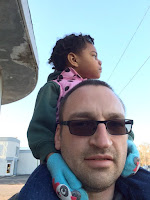I agree, your child should not be your first black friend
His parents were among the first wave of transracial adopters, and did their best to prepare him for the real world.
Parents today can do even better, he says. "I don't have a checklist," he says, "but if I did, it would sound something like this: If you don't have any close friends or people who look like your kid before you adopt a kid, then why are you adopting that kid? Your child should not be your first black friend."
I was reading a story on NPR the other day called "Growing Up 'White,' Transracial Adoptee Learned To Be Black," and was fascinated enough to share it on my personal Facebook feed. This is a bit unusual, because I've been on an anti-mayo kick on that page, much to the chagrin of many friends who love that bland bread-moistener.
I broke format because Chad Goller-Sojourner's account of his childhood spoke to me personally, because we are a transracial family ourselves. And the quote above is from the end of Goller-Sojourner's story, which sparked this question from a friend, "What was your perspective on his closing argument?"
My first response is he's absolutely right. You're going to want someone you can trust to talk about your fears about raising your child in a world where you will be stared at just because you are visibly a mixed-race family. To me, I want to have several people around I trust to help answer The Kid's questions about being black in America, because I have very little clue about what that's really like.
As I was thinking about answering the question that night, I read the article that preceded Goller-Sojourner's story. Entitled, "Transracial Family Gets Double Takes 'Everywhere We Go,'" it was the perspective of a white woman who adopted two black children with her husband. It was a perspective that frustrated me.
To help her sons understand their race and heritage, they hired a woman to be their mentor. Outside of their neighbors who happen to be Black, this family did not identify anyone else of color they exposed their kids to except someone they had to hire. Now, this person is an invaluable resource to the family and I'm sure she's a trusted friend.
But what does it say to those children that Mommy and Daddy had to hire someone who looked like them? And do Mommy and Daddy think that hiring someone is enough? Or will they bother to have friendships based on interests and understandings without a monetary exchange?
My response to my friend's question did not change after reading the second NPR article. In fact, it hardened my position. My daughter deserves to know that having friends of color, of different political outlooks, of different economic backgrounds, of different sexual orientations, is truly a part of who her parents are, not a stunt we pulled when we decided to adopt her.


